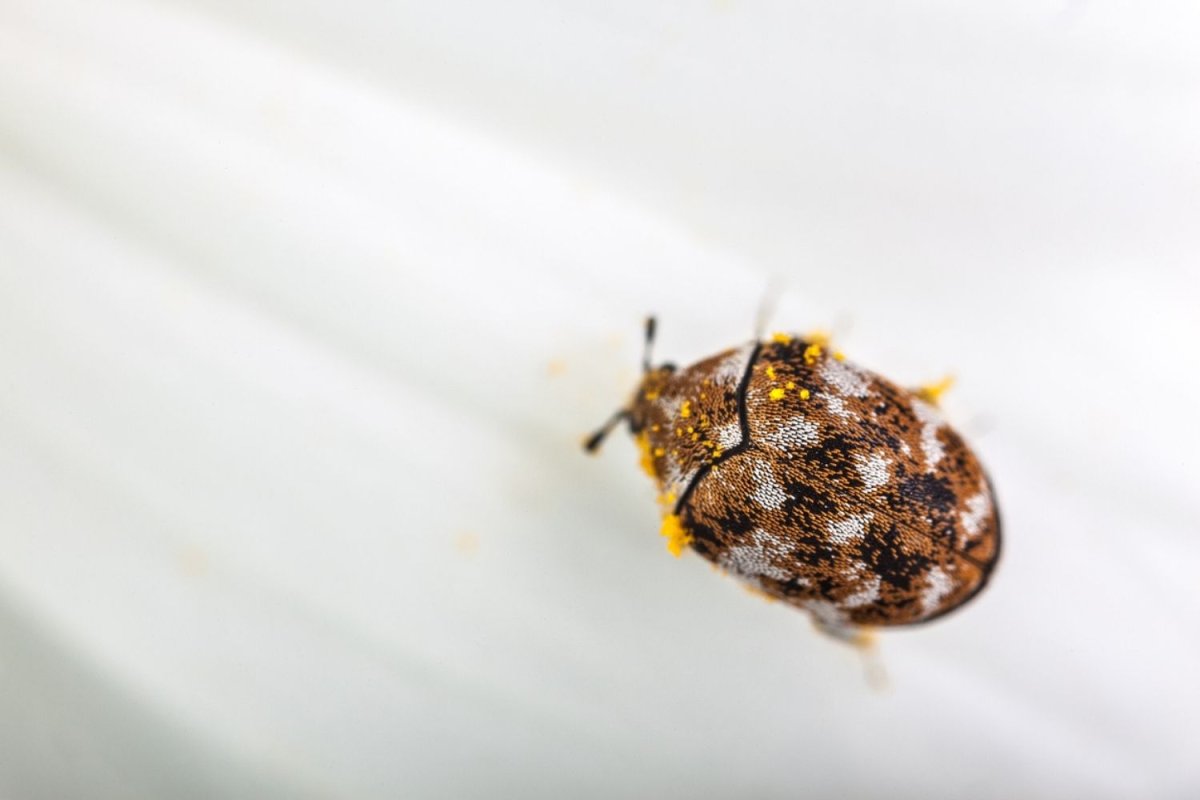

We may earn revenue from the products available on this page and participate in affiliate programs. Learn More ›
Carpet beetles enter your home in myriad ways: hitching rides on cut flowers, clothing, or pets, or simply flying in through open windows. Once inside, carpet beetles can settle in and lay eggs, and their larvae can wreak havoc on rugs, curtains, upholstery—even your clothing.
“They like organic material,” says Kyle Morgan, owner and founder of Care Pest Pros in Spicewood, Texas. “They’ll feast on rugs, carpet, clothing, even the dried-out carcass of a mouse in your attic,” he adds. Don’t give carpet beetles a chance to do any real damage. As soon as you spot one of the little buggers, follow this multi-pronged strategy for getting rid of carpet beetles fast.
What are carpet beetles?
Carpet beetles are among the most destructive insect invaders. They tend to congregate around windows and doorways, so check these areas if you suspect an infestation. While irksome, adult carpet beetles, which also can enter the home through electrical outlets, are harmless; only in the larval stage are they a threat to natural fibers.
What do carpet beetles look like?
In the adult stage, these creepy culprits are oval, less than ¼ inch long, and either brown, black, or a mottled combination of tan, white, and black. In the larval stage, they are ⅛ to ¼ inch long, and have a tan and brown striped appearance. The larvae also sport bristly hairs. Carpet beetles, Morgan says, are sometimes mistaken for bed bugs, which have more of a striped appearance, as opposed to carpet beetles’ mottled look.
Where do carpet beetles live?
Don’t assume from the common name alone that these pests dwell only in carpets. As a general rule, they favor dark areas, including:
- Behind baseboards
- Pantries
- Closets
- Dressers (especially where furs or wool clothing are stored)
- Sofas
- Armchairs
- Other upholstered furniture
- Attics
Dust bunnies under furniture and in corners, especially with pet fur and dander, are likely attractions for carpet beetles, too.
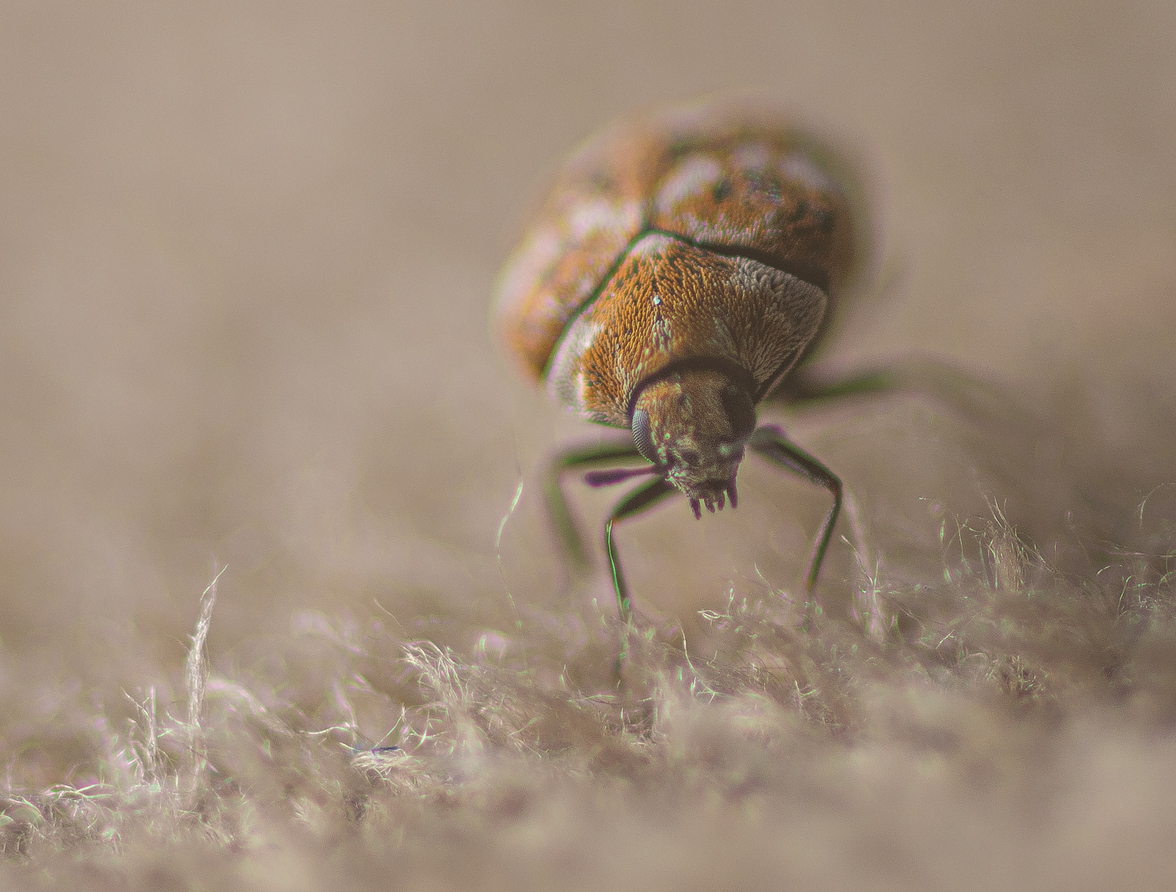
What do carpet beetles eat?
While synthetic fibers are safe, natural textiles such as the following are susceptible to carpet beetle damage:
- Cotton
- Linen
- Silk
- Wool
- Leather
Natural fiber rugs and carpets, of course, are the carpet beetles’ primary food sources. But the pantry, too, might serve these pests. Some species of carpet beetles feed on:
- Pasta
- Flour
- Cornmeal
- Dry pet food
There are types of carpet beetles that eat dried flowers and potpourri, and even animal hides.
How Carpet Beetles Reproduce
The life cycle of a carpet beetle might be a mere 2 months to several years long. Adults can deposit more than 100 eggs, which hatch within 7 to 35 days. While carpet beetle larvae can survive for several weeks without food, it’s at that stage when the insects are most destructive.
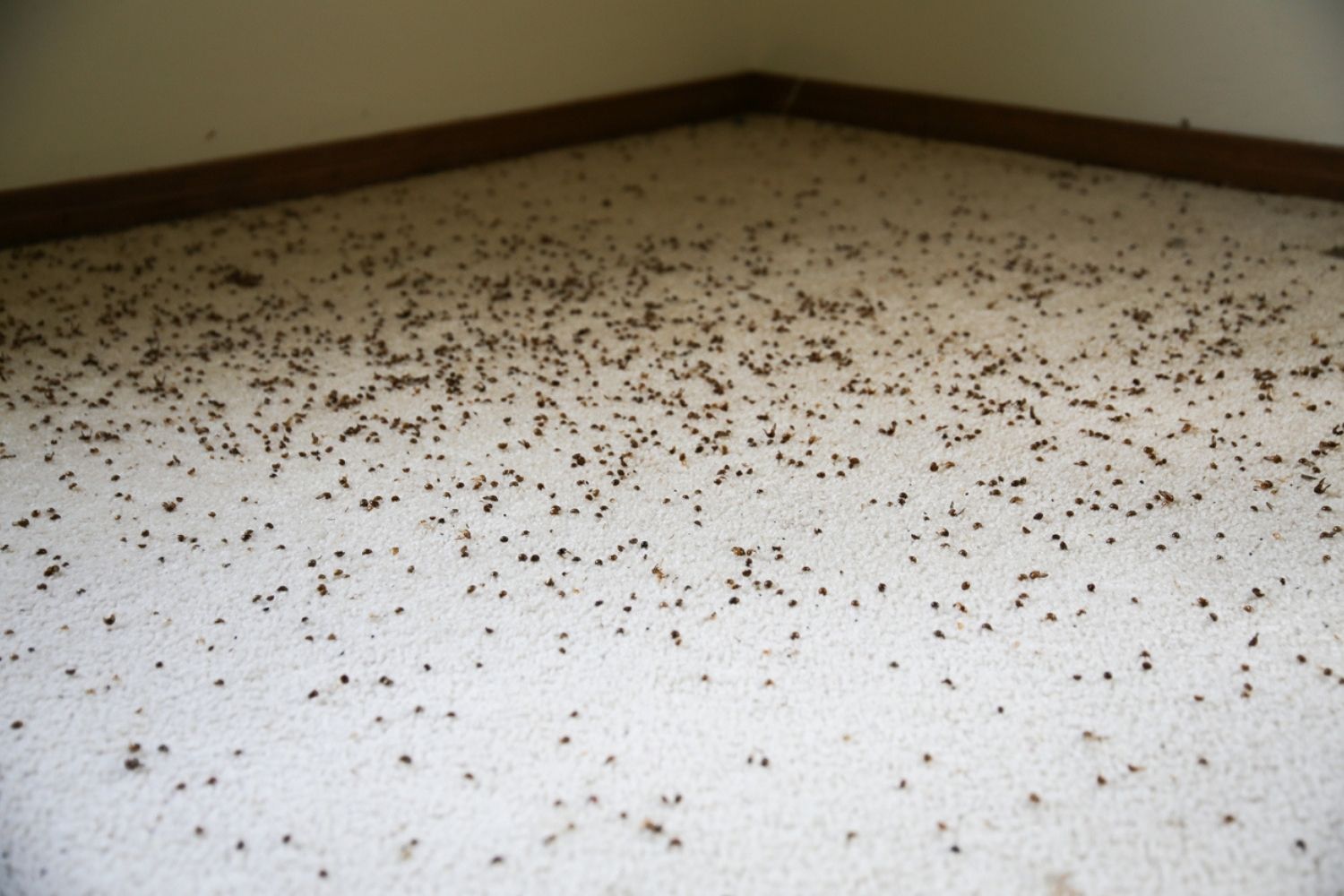
Signs of a Carpet Beetle Infestation
Carpet beetle eggs are tiny and very hard to see, so most folks don’t notice an infestation until they spot damage to fabrics or other items. Look for:
- Bare spots in rugs or small holes in clothing or furniture fabrics
- Shorter carpet nap or irregular open spaces in the weave
- Larger holes indicating where carpet beetles have inflicted significant damage
“They’re more commonly seen in the warmer months,” says Morgan, so be particularly vigilant in spring and summer, he says.
RELATED: 15 DIY Solutions for a Pest-Free Home
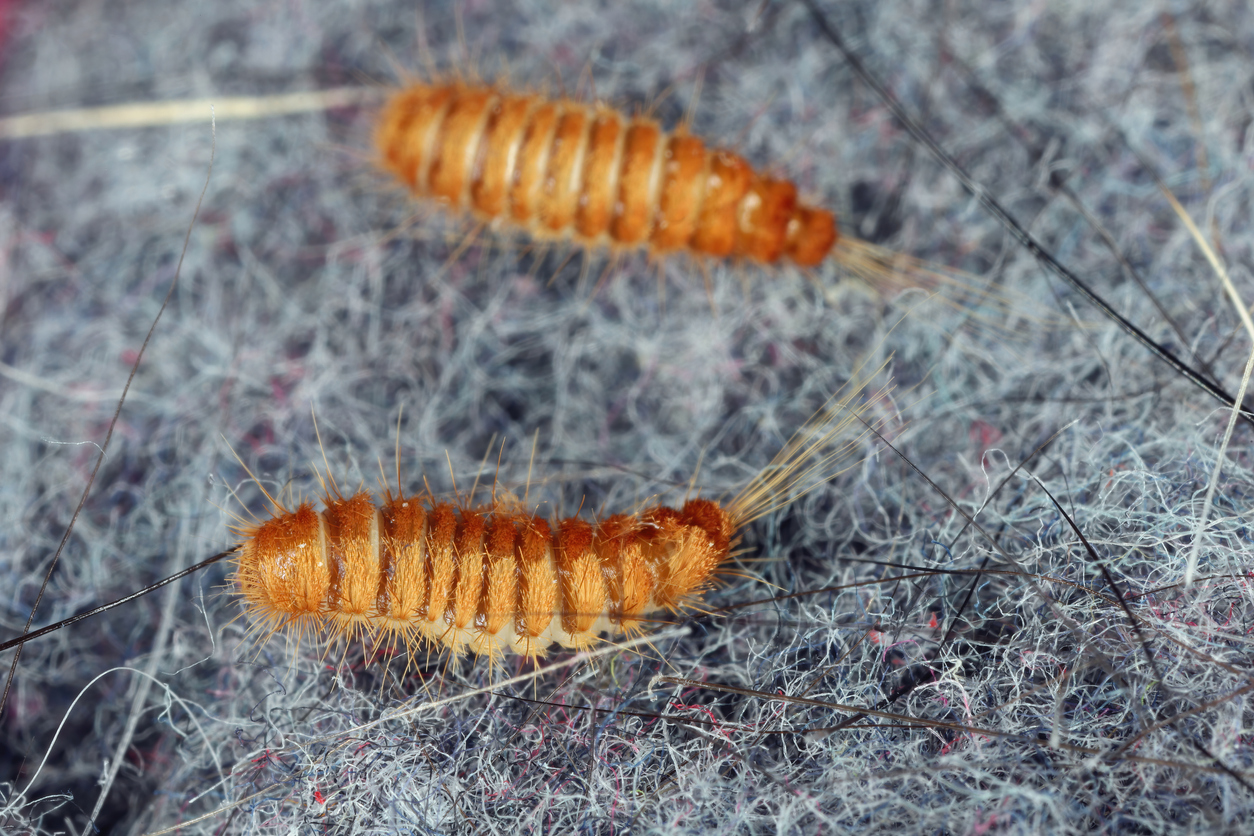
How to Kill Carpet Beetles and Carpet Beetle Larvae
The good news is that once you’ve identified their presence, you usually can banish carpet beetles without the expense of an exterminator. The first step, says Morgan, is to identify the area with the highest concentration of beetles and offspring and start your efforts there. “If you have a nice silk shirt that’s been chewed up, toss the shirt, and then wash and dry everything else in the closet on high heat,” Morgan says.
Here are six ways to attack destructive larvae, plus a treatment to get rid of adult carpet beetles for good. Whenever possible, choose methods that are the least harmful to a home’s occupants or the environment:
1. Boric Acid

Boric acid, which acts as a poison on insect metabolism, is only hazardous to humans if ingested or inhaled in large quantities. You can find it in powder form at pharmacies, or in the laundry aisle of supermarkets. Sprinkle it lightly and evenly on the carpet, then use a broom or brush to distribute it into the fibers. Wait several hours and vacuum thoroughly.
You might also prepare a larvae-killing spray by adding 1 tablespoon of boric acid to 2 cups of hot water and stirring until the powder dissolves. Fill a plastic spray bottle with the solution and mist curtains, upholstery, baseboards, and dark nooks and crannies.
RELATED: 10 Tiny Bugs in Your House and How to Get Rid of Them
2. Diatomaceous Earth
Another natural product, diatomaceous earth (available via agricultural feed stores and various online retailers) is a desiccant that kills quickly by dehydrating larvae. Treat rugs in the method described for boric acid above, and sprinkle some diatomaceous earth in the back of cabinets and closets and around baseboards. Be sure to choose food grade diatomaceous earth, and wear gloves and a respirator or mask to keep from inhaling the fine dust particles when applying it.
3. Vinegar

Both white and apple cider vinegar are effective against carpet beetles. Pour straight vinegar into an empty spray bottle and mist well on furniture, carpets, and clothing. If you discover signs of a carpet beetle infestation in a closet or dresser drawers, you may wish to wash clothing stored there in a vinegar and water solution to kill larvae and/or eggs.
4. Vacuuming and Steam Cleaning
Morgan tells his clients to “vacuum, vacuum, vacuum” to address a carpet beetle infestation. “Vacuum the crevices, and just clean and vacuum everything thoroughly,” he says. “And then immediately empty the vacuum canister outside,” he adds. Regular vacuuming can get rid of carpet beetles, sometimes before they have a chance to do much damage.
Be sure to add the right vacuum attachments to get into crevices and clean drapes and upholstery. Heat is another powerful weapon against carpet beetles, so steam cleaning your home will kill larvae and eggs and then suck them up.
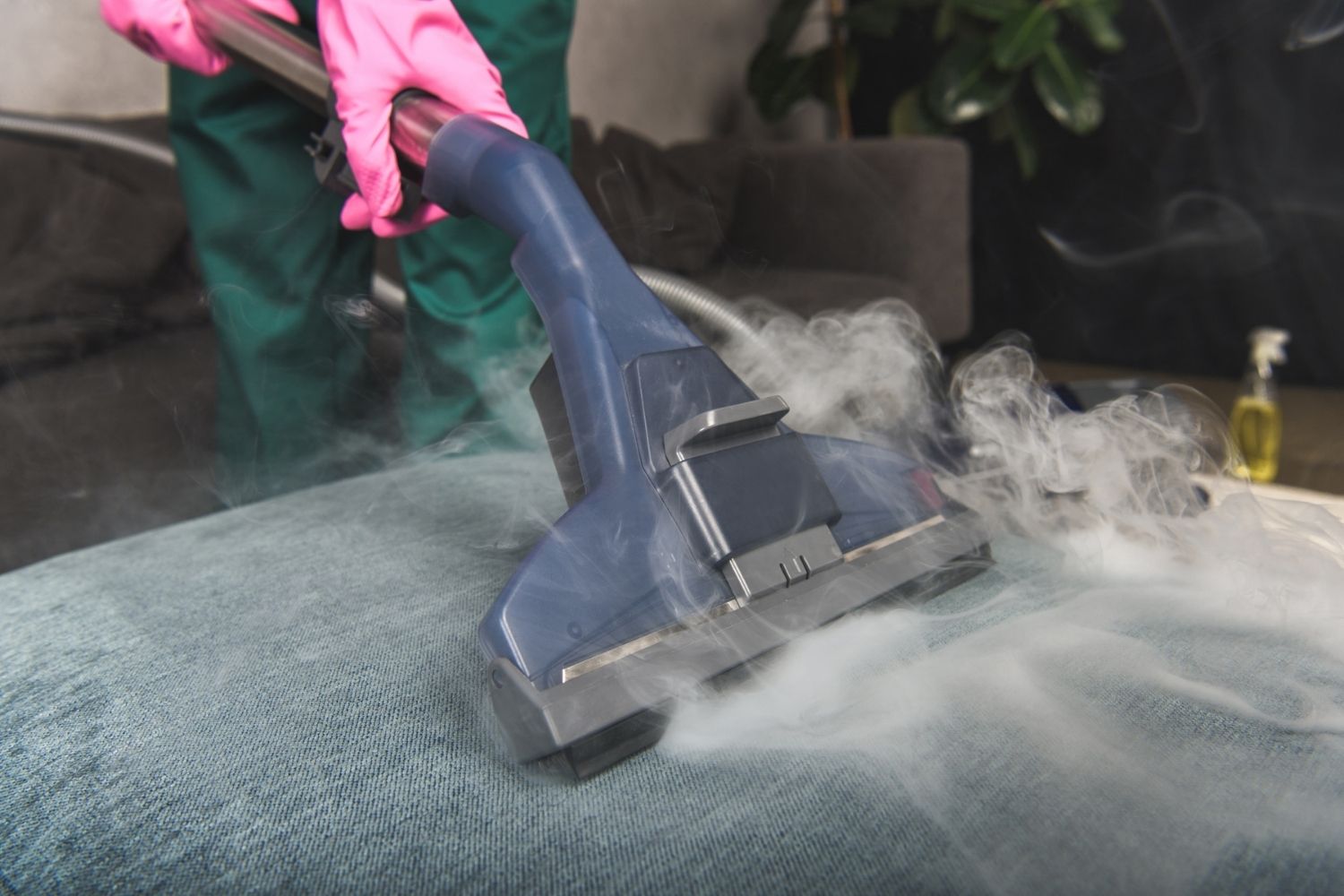
RELATED: The Best Steam Cleaners, Tested and Reviewed
5. Insecticide
If all else fails, you can quell an active larvae infestation by treating carpet or upholstery with an insecticide that contains at least one of the following ingredients: deltamethrin, tetramethrin, bifenthrin, or cyfluthrin. Test in an inconspicuous area before treating the entire carpet to ensure the product won’t stain. Because of the potential danger associated with their use, insecticides should be your last resort. Most of these chemicals have cautions against use around people and pets, so follow the manufacturer’s instructions carefully.
6. Fogger
Adult female carpet beetles flying around the house might not be destroying your belongings, but they can keep the cycle going by laying eggs, and restarting the whole nasty process. A last resort for addressing carpet beetle adults is to use a flying insect fogger. Foggers carry many precautions, especially for infants and children.
How to Prevent Carpet Beetle Infestations
Prevention is always the most effective, and least harmful, way to control insects. Once you’re rid of carpet beetles, make a few smart moves to keep them from coming back.
- Hang sticky flypaper strips near windows to prevent adult carpet beetles from entering your home.
- Place sticky pheromone-type traps on windowsills and in closets to keep carpet beetles from laying eggs.
- Keep dry foodstuffs like noodles and flour in airtight containers.
- Stick to a weekly dusting, sweeping, and vacuuming schedule so carpet beetles can’t get a comfortable footing in your home.
- Note that carpet beetles prefer to feed on soiled fabrics, so clean clothing of spills, perspiration, and other substances before storing it.
FAQs
Ideally, none! If you happen to notice one carpet beetle, be it worm-like larvae or a flying adult, chances are others exist in your home—or will be invading soon enough.
Adult carpet beetles have wings and can fly into a home through open doors and windows, or through holes in screens, most often in springtime. Once indoors, they lay their eggs in dark areas. A lax attitude toward dusting, sweeping, and vacuuming can make a home more hospitable to carpet beetles, so an infestation may be more likely to occur in an unkempt space.
No, carpet beetles do not harm people or pets. They don’t bite or sting, nor do they carry disease or emit any poisonous substances. But they can certainly be a danger to pricey home goods like wool rugs, quality silk and linen clothing, and other natural fibers.
